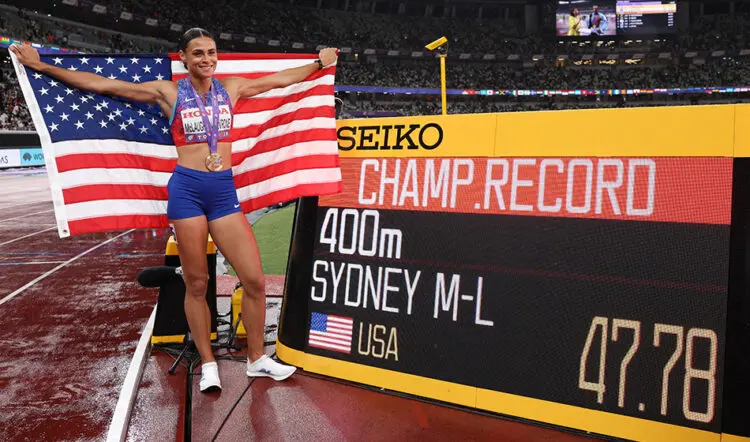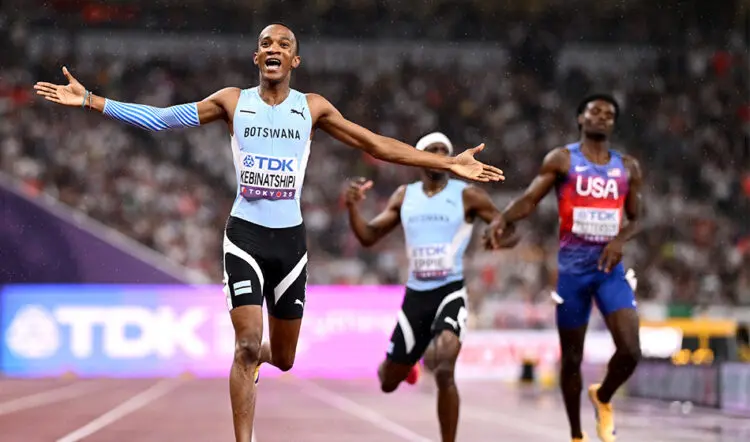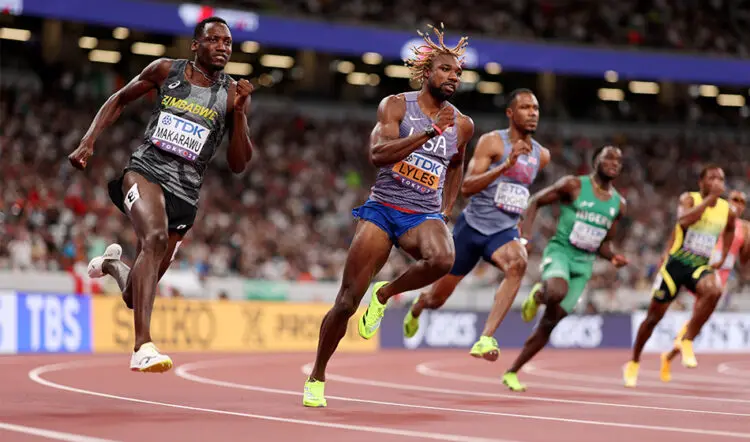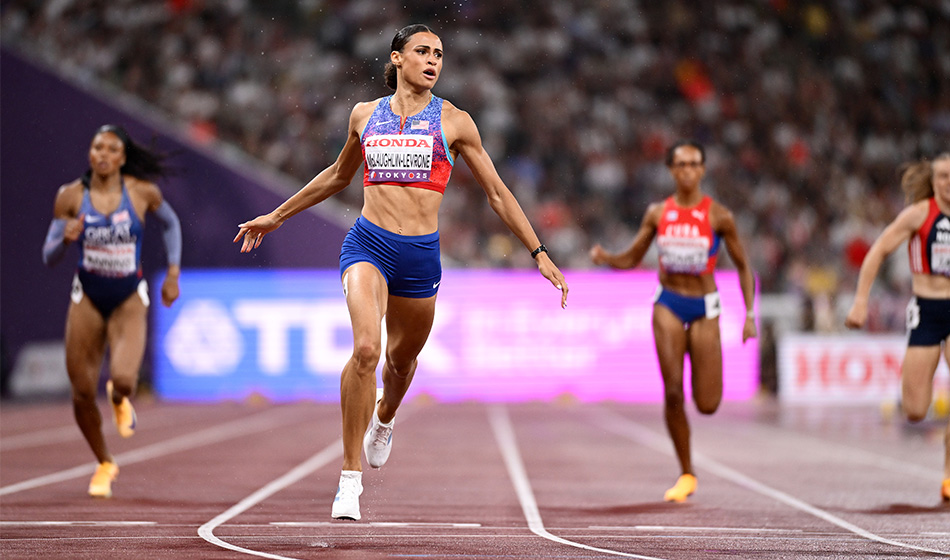American breaks championships best and places infamous world record under threat with a show of one-lap brilliance.
Sydney McLaughlin-Levrone insisted that, by stepping away from the 400m hurdles to focus on the flat 400m at the World Championships in Tokyo she was stepping outside of her comfort zone.
On Thursday evening (September 18), however, she looked anything but uneasy as she broke the championship record and clocked the second-fastest 400m in history, by winning gold in a remarkable time of 47.78.
That run brought the demise of the 47.91 set by Jarmila Kratochvilova at the inaugural edition of these championships back in 1983 and brings the 40-year-old 47.60 world record of Marita Koch – which many allege the East German only managed to achieve through doping – firmly into view.
Indeed, but for the rain and wet underfoot conditions at the Japan national stadium, it might already have been consigned to history.
 (Getty)
(Getty)
This was no procession in the park for the American, however. Unlike her hurdles performances, when she enters the final straight having established a lead that only gets bigger, here she was pushed every step of the way.
For the first time ever, two women ran under 48 seconds in the same 400m as Olympic champion Marileidy Paulino set a national record for the Dominican Republic with 47.98, while former world champion Salwa Eid Naser clocked 48.19 for bronze.
“Grateful,” was how McLaughlin-Levrone, competing on the same track where she won Olympic 400m hurdles gold and broke the world record at the 2021 Olympics, felt. “You know it’s there and you put the work in but when you see it come to fruition it’s always a bit of disbelief. I knew it was going to be a really fast race, [it was a] great competition and, to see it come together, there’s always a bit of awe.
“I knew the strength was there and especially after that semi-final [when she broke the US record] I knew there was more in the tank so it was about staying composed.
“I know there was a lot of doubt from a lot of people about making this switch so I just wanted to show myself that I could do it. It just shows that anything is possible.
“This wasn’t my title to hold on to, it was mine to gain. [Coach Bobby Kersee] uses boxing terms all the time and he told me: ‘You’ve got to go out there and take the belt. It’s not yours and you’ve got to go and earn it’ so it was all about running the best race that I could.”
McLaughlin-Levrone now holds world titles in three different events – the 400m, 400m hurdles and the 4x400m relay. Speaking earlier in the day, World Athletics President Seb Coe expressed a wish to see her tackle yet another discipline in future.
“I’d be really interested to see what she could do over 800m,” he said.
“No comment,” was the new 400m world champion’s succinct reply.
There will now be even more attention upon her when next she tackles the one-lap event and the British record-holder Amber Anning, who was fifth in a season’s best of 49.36, insisted she is inspired by the rising standards.
“It is just amazing where 400m has come in the last couple of years,” she said. “I remember five years ago my time would have been on the podium. It has just progressed every single year. I love it. It makes me want to step up my game, and I want to be able to be amongst that time and push my time down. To see it done, it just gives hope to us all.”
 (Getty)
(Getty)
The winner of the men’s 400m final created a slice of history, too, with Botswana’s Collen Kebinatshipi becoming his country’s first ever world champion in a men’s event. The 21-year-old backed up his world-leading national record of 43.61 from the semi-finals by going faster still to take gold in 43.53 and celebrated by performing a set of press-ups on the track.
He held off the challenge of Trinidad and Tobago’s Jereem Richards, who broke the national record with 43.72, while Bayapo Nadori added to Botswana’s medal tally with bronze in 44.20.
With the more established names such as Olympic champion Quincy Hall, Matt Hudson-Smith and Muzala Samukonga absent, there was an opportunity to be seized, and up stepped Kebinatshipi.
American Jacory Patterson had produced a huge PB of 43.85 earlier this year but showed he still has work to do after clocking 44.70 for seventh.
 (Getty)
(Getty)
Meanwhile, Noah Lyles told Tokyo to expect something “magical” after he sent out a huge signal of intent in clocking a world-leading time of 19.51 (1.0) to qualify fastest overall from the men’s 200m semi-finals.
With the race well and truly won, the defending champion appeared to keep his foot to the floor in the closing stages, but insisted he eased down, and made his satisfaction clear to the crowd as he celebrated his progress to Friday’s final.
“I surprised myself,” said the Olympic bronze medallist. “I kind of backed up a little bit as we got to the last 20 metres. I am going to put on a whole race in the final.
“When I got up after the first 50 metres, I thought I heard Zharnel [Hughes] running along and I said to myself: ‘You ain’t catching me’. The message today was that they can’t beat me. I knew I was running fast when I exited the curve but I didn’t expect 19.51. Don’t miss the final – it’s going to be magical.”
Lyles’ chief rivals, Bryan Levell of Jamaica, US team-mate Kenny Bednarek and Olympic champion Letsile Tebogo, were second, third and fourth-fastest qualifiers with 19.78, 19.88 and 19.95 respectively. Britain’s 2023 world 100m bronze medallist Hughes also progressed with 19.95.
However, Gout Gout’s first world championships adventure came to an end. The sub-20 clocking the Australian teenager had craved proved elusive in the Japanese rain as he finished fourth in the heat that also featured Levell and Tebogo with a time of 20.36.
In the women’s semis, defending champion Shericka Jackson suggested she could be starting to find form again as she ran a season’s best of 21.99 to qualify fastest for the final.
Melissa Jefferson-Wooden’s bid for a 100m/200m double remains on track after she progressed serenely by winning her heat in 20.00, while Britain’s Amy Hunt landed a PB of 22.08 to finish third-fastest overall. She is joined in the final by former world champion Dina Asher-Smith, an automatic qualifier in 22.21, but last year’s European silver medallist Daryll Neita exited the competition after her run of 22.37.
“I wanted this final so much, no matter what,” said Hunt. “It’s so special to run my PB here to make it to the final. I’m happy to have delivered what I wanted and what I knew I was capable of.”


AloJapan.com